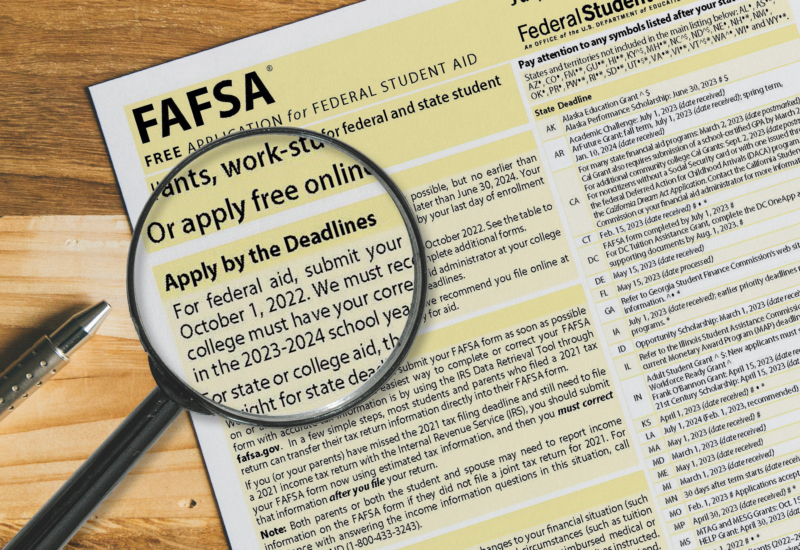Start Building Your Child’s Credit
If your parents are divorced or separated, reporting parent financial information as a dependent student on the Free Application for Federal Student Aid (FAFSA) can be complicated. However, properly reporting financial information is crucial for the success of your application since FAFSA can ask for verification of the data you submit.
So, how does FAFSA verify child support? If you’re planning on completing the FAFSA to help pay for college, this guide will explain what counts as child support on FAFSA, how it’s verified, and what you can do to simplify the verification process.
Reporting Child Support on FAFSA

The newest FAFSA rules have brought some important changes to the application process, with child support reporting being one of the affected aspects. According to the 2024–25 FAFSA updates, child support received will now be counted as part of assets instead of income. It will be factored into the Student Aid Index (SAI), which is a metric used to determine how much financial aid a student needs.
If your custodial parent receives child support payments, they’re required to indicate this on the FAFSA. Misrepresenting information or failing to report child support payments may result in your student aid application being canceled.
On the other hand, child support paid will no longer be considered, which means your parents will have to report only the child support received on the new FAFSA application. Federal Student Aid officers also reserve the right to verify child support information that you provide and ask for supporting documentation if necessary.
How Does FAFSA Verify Child Support?
FAFSA has a verification process (called targeted FAFSA verification) that ensures that the information submitted on your financial aid application is correct. This can include parental information, such as:
- Your parents’ marital status
- Parental assets and investments
- Custody details
- Child support payment history
Not all students go through the targeted verification process. Both the Department of Education and the federal aid office at the specific institution can select students for verification, during which different elements of their applications are reviewed.
Most colleges verify a majority of their students’ FAFSAs regardless of whether they’re selected for targeted verification, but usually, less than five data elements are verified per applicant. Meanwhile, the set of data elements subject to targeted verification may change from one year to the next. This table shows the data elements that can currently be reviewed during targeted verification:
| Type of Applicant | Data Elements for Verification |
| Standard Verification Group | Adjusted gross income Untaxed portions of pensions Untaxed portions of IRA distributions U.S. income tax paid Income earned from work Education credits IRA deductions and payments Foreign income exempt from federal taxation Family size |
| Custom Verification Group | Identity elements (such as your Social Security number (SSN)) Statement of educational purpose |
Although child support is currently not on the official list of elements for targeted verification, FAFSA may verify any data element that seems anomalous. This is why it’s best to accurately report child support and keep the documents to back it up.
Documents That Can Help You Pass FAFSA Child Support Verification
If your parent has indicated any child support they received on FAFSA, you may need to fill out a support verification document indicating the years your parent was paid child support and the amounts they received.
You and your parents may also need to provide your signatures, as well as documentation to verify the child support amounts, such as:
- A copy of the separation agreement or divorce decree that shows the amount of child support to be provided
- A statement from the parent receiving the child support showing the amount provided
- Copies of the child support checks or money order receipts
The college financial aid office reserves the right not to process requests or disburse federal student aid until the verification process is complete. They also have the right to ask for any documentation they feel is necessary to complete verification. If your family refuses to supply the documentation, the college is prohibited from granting you federal student aid.
What Counts as Child Support on FAFSA?

The U.S. Department of Education restricts “child support” for the purpose of a FAFSA application to only include amounts paid in direct compliance to a:
- Valid separation agreement
- Legal child support agreement
- A divorce decree
While child support doesn’t have to be court-ordered to be reported on the FAFSA, voluntary payments made by a non-custodial parent to their child’s education are regarded as the child’s untaxed income and shouldn’t be reported under child support.
Reporting voluntary payments may be a disadvantage for your application because it will reflect you as having more assets. This may result in a higher SAI and lower the amount of aid you qualify for.
Tips for Reporting Child Support on FAFSA
Reporting child support information on the FAFSA—or verifying any information for that matter—can be a hassle. Here are a few tips to make the process easier:
- Start early—FAFSA applications usually open around the first week of October every year. You want to start the application process as early as possible to avoid rushing through it and making mistakes that may hurt your chances of securing aid
- Create a Federal Student Aid ID (FSA ID)—A unique FSA ID allows you to securely sign in to the various U.S. Department of Education websites, including FAFSA, simplifying the reporting process and protecting your financial aid information
- Use the IRS Data Retrieval Tool (DRT)—The IRS DRT lets you transfer your and your parents’ tax information from the IRS directly to the FAFSA, eliminating the need for manual entry and reducing the chances of errors
When reporting information to FAFSA or submitting verification documents, prioritize data security and identity protection. As you can see, the FAFSA verification process requires a lot of sensitive information—such as your SSN—that you’ll want to keep secure.
If you become a victim of identity theft or FAFSA fraud due to stolen private information—which isn’t uncommon for college students—your FAFSA verification may highlight discrepancies that can derail your college plans. That’s where identity protection services like FreeKick come in, and it’s a good FAFSA tip to discuss getting such a service with your parents.
FreeKick—A Two-In-One Identity Protection and Credit Building Solution
Both a secure identity and a good credit profile are crucial for a successful FAFSA application. A secure identity helps you clear FAFSA verification, while a good credit profile shows you’re financially responsible, increasing your chances of obtaining student loans.
To help you with both these aspects, Austin Capital Bank offers FreeKick—an FDIC-insured deposit account and subscription service that helps your parents protect your identity and build a solid credit profile for you.
Securing Your Identity With FreeKick
Child identity theft happens every 30 seconds. If you fall victim to it, you may fail your FAFSA verification because your personal information has been tampered with. To make matters worse, you may also get charged with grave crimes like credit card theft, which is why it’s good advice for your parents to sign up for identity protection.
FreeKick’s identity protection services include:
| Services for Minors | Services for Adult Children and Parents |
| Credit profile monitoring SSN monitoring Dark web monitoring for children’s personal information Up to $1 million identity theft insurance Full-service white-glove concierge credit restoration Sex offender monitoring—based on sponsor parent’s address | Credit profile monitoring SSN monitoring Dark web monitoring for personal information Up to $1 million identity theft insurance Full-service white-glove concierge credit restoration Lost wallet protection Court records monitoring Change of address monitoring Non-credit (Payday) loan monitoring Free FICO® Score monthly FICO® Score factors Experian credit report monthly |
Building Credit With FreeKick
FreeKick’s credit building service is designed for individuals between 13 and 25 years of age. It’s a great way to establish a credit history early on in life via three simple steps:
- Create an Account—With the help of your parents, create an account at FreeKick.bank and choose a deposit that suits your parents’ budget
- Set It and Forget It—Once your parents activate the account, FreeKick will start building 12 months’ worth of credit history for you and your siblings
- Keep Growing—After 12 months, your parents can close the account without any fees or continue building credit for you for another year
The result is a payment history and a credit history head start of up to five years when you become an adult. This translates into $200,000 saved during your lifetime due to better loan terms, making FreeKick one of the best investments for young adults.
FreeKick Pricing
FreeKick offers two pricing plans, both of which are FDIC-insured up to $250,000. See the table below for more details:
| FDIC-Insured Deposit | Annual Fee |
| $3,000 | $0 (Free) |
| No deposit | $149 |
Both plans include:
- Credit building for six children aged 13–25
- Identity protection for two parents and six children aged 0–25
Make sure your FAFSA verification goes smoothly—have your parents sign up for FreeKick today.

Freekick provides a double dose of financial empowerment and security for your whole family. It helps teens and young adults build strong credit profiles and offers identity motoring for up to two adult parents and six children under 25.





